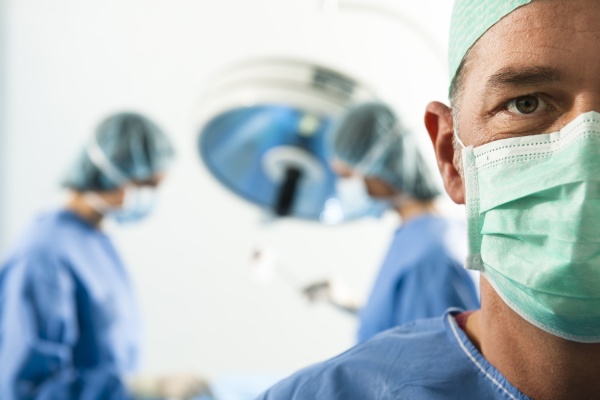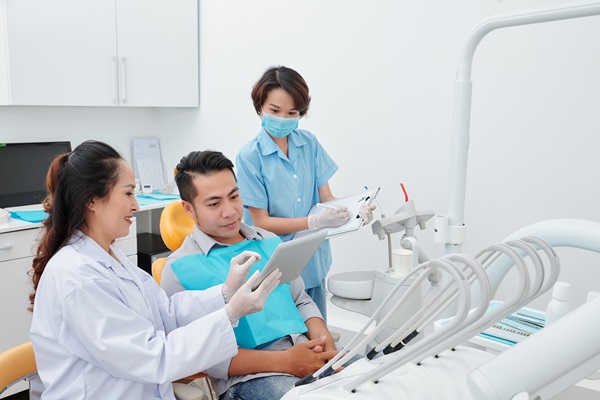What You Can Eat and Drink After Oral Surgery

Common oral surgery procedures such as tooth extraction, wisdom tooth removal, and the fitting of dental implants require you to watch what you eat and drink after the surgery — but choosing the right food and drink can be a challenging task.
Since you might be temporarily incapacitated after your oral surgery procedure due to anesthesia, it is possible you will not be able to drive or travel to buy food. Be sure to prepare ahead of time by purchasing foods that you will be able to eat in the days, and sometimes weeks, after surgery. Although your oral surgeon will take you through the basic foods and beverages you are allowed to consume, consider this guide as a checklist of what to eat and, more importantly, what not to eat.
Drink water
Staying hydrated is crucial after any major or minor surgery. Sip on a little more water than your normal daily amount to flush food particles away from the affected area. Drinking fluids following oral surgery will also speed up the healing process and help to prevent conditions like dry socket.
However, when drinking liquids, do so by sipping on a cup or bottle. Do not use a straw, as the suction could dislodge any dressings on the wound.
Foods to eat
Dentists recommend soft foods that are easily ingestible. These include:
- Creamy soups and broths
- Applesauce
- Smoothies
- Ice cream
- Mashed potatoes and other vegetables
- Yogurt
- Avocado
- Scrambled Eggs
Smoothies
Although smoothies are a great option for your recovery period, steer clear of blending fruits with small seeds. Blackberries and strawberries have seeds that can get stuck in open wounds and cause complications. Also, consider adding protein powder to smoothies for a nutritional boost.
Mashed vegetables
Mashed vegetables such as peas, carrots and butternut squash are a soft and nutritious substitute for carbohydrate-heavy mashed potatoes.
Yogurt
Greek yogurt is a healthy food that is high in protein. The protein kicks your recovery into high gear and aids in healing. It is also a great source of vitamins and minerals like zinc and calcium.
Foods and beverages to avoid
- Alcohol
- Crunchy food
- Popcorn
- Rice
- Spicy foods which can aggravate the wound
Alcohol
The consumption of alcoholic beverages is usually prohibited following any procedure. Alcohol can interfere with postoperative medication and can cause dehydration, which in turn slows the healing process.
Rice
Grains like rice can get wedged into the wound, much like the small seeds in strawberries. If you are craving carbohydrates, go with a softer option like macaroni and cheese.
The bottom line
After oral surgery, you will need to choose foods that are soft, packed with protein and rich in nutrients. Drink lots of water, and try to avoid beverages that will dehydrate you. Certain salty foods can cause dehydration as well, so steer clear of foods that are high in sodium. Prepare for oral surgery by stocking your kitchen with these foods, and plenty of water, to make sure your recovery goes smoothly.
Request an appointment here: https://austinlakesdentistry.com or call Austin Lakes Dentistry: Scott T Gordon DDS at (512) 266-1308 for an appointment in our Austin office.
Check out what others are saying about our dental services on Yelp: Oral Surgery.
Recent Posts
Learning about some of the more commonly used oral surgery procedures allows dental patients to understand more about any procedures that can improve their dental health. Updated dental technologies allow dental surgery to be quick and safe, giving patients peace of mind. Know that a general dentist can typically perform certain types of surgical procedures.With…
Oral surgery is often necessary to remove impacted teeth. A tooth is said to be impacted if it fails to emerge fully through the gum tissues because something inhibited its eruption, such as bone, malocclusion, cysts, dense soft tissue or other teeth. This problem is common with wisdom teeth, usually because there is no longer…
Learning more about the oral surgery treatments now available for smile makeovers is something everyone should do when interested in improving the way their smile looks. There are more cosmetic dentistry options available than ever before for you to choose from, which means you have lots of options when it comes to cosmetically designing your…
Looking for information on oral surgery? If you are currently in need of a simple surgical procedure in order to improve your dental health, then learning more about the different types of oral surgery procedures that dentists can perform is a great idea.Understanding more about oral surgery is a great idea, as there are different…


